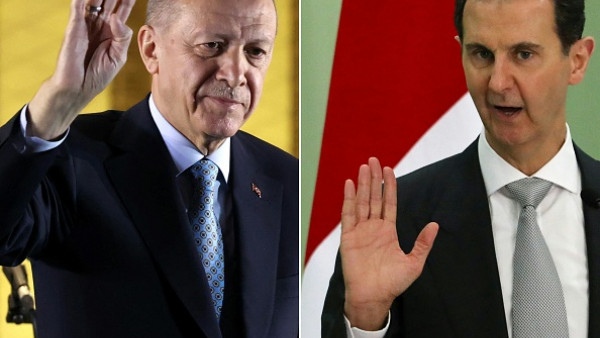President Recep Tayyip Erdogan on Sunday said he might invite his Syrian counterpart Bashar al-Assad to Turkey “at any moment”, in a sign of reconciliation after the 2011 war broke ties between Ankara and Damascus.
Erdogan’s comments come after tensions have mounted over the past week after a mob went on the rampage, vandalising businesses and properties owned by Syrians in a central Anatolian city.
“We may send an invitation (to Assad) at any moment,” Erdogan told journalists aboard a plane from Berlin where he watched Euro 2024, the official Anadolu news agency and other media reported.
Turkey originally aimed to topple Assad’s regime when the Syrian conflict erupted with the violent suppression of peaceful protesters in 2011 and backed rebels calling for his ouster.
But more recently, Ankara has shifted focus to preventing what Erdogan in 2019 dubbed a “terror corridor” from opening up in northern Syria.
He has long said he could reconsider ties with Assad as his government is working to ensure safe and voluntary return of Syrian refugees.
Speaking to journalists, Erdogan said some leaders including Russian President Vladimir Putin suggested to mediate a meeting with Assad in Turkey.
“Now we have come to such a point that as soon as Bashar al-Assad takes a step towards improving relations with Turkey, we will show him the same approach,” Erdogan said.
Turkish authorities this week detained over 470 people after anti-Syrian riots in several cities sparked by accusations that a Syrian man had allegedly harassed a Syrian minor in Kayseri.
Erdogan on Monday blamed the opposition for stoking tensions and condemned the anti-Syrian violence as “unacceptable”.
The fate of Syrian refugees is a burning issue in Turkish politics, with Erdogan’s opponents in last year’s presidential election promising to send them back to Syria.
Turkey, which hosts some 3.2 million Syrian refugees according to UN data, has been shaken several times by bouts of xenophobic violence in recent years, often triggered by rumours spreading on social media and instant messaging applications.
The riots in Kayseri spread to several other cities including Istanbul this week while clashes between armed protesters and guards of Turkish positions in Syria’s north killed seven people.
Turkey has launched a string of offensives in Syria since 2016 targeting Kurdish militias, Islamic State group jihadists and forces loyal to Assad.
Pro-Turkish forces in Syria now control two vast strips of territory along the border.
On Monday, hundreds of Syrians demonstrated throughout the Ankara-controlled area, with some armed protesters attacking Turkish trucks and military posts, and taking down Turkish flags.
Erdogan has vowed to reveal “which dirty hands” triggered the clashes in northern Syria.
According to the Syrian Observatory, four border crossings with Turkey have been shut in the wake of the violence. There was no immediate confirmation by the Turkish government.


